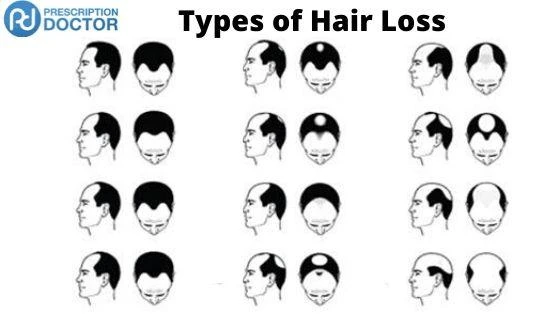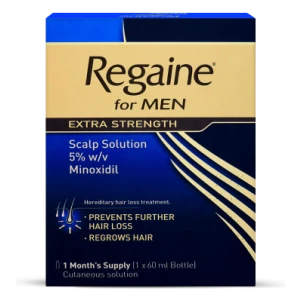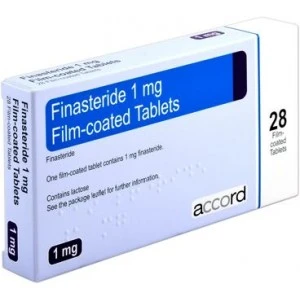Finasteride
Prices from £13.95
Review More Prices
- Click on the green "Get Started" button, then click "Start Consultation" button on the next page.
- Fill in our short consultation form.
- Choose delivery method and mode of payment.
- Our team of expert prescribers will assess whether medication is suitable.
- If you get the green light and it is deemed suitable, your order will be processed quickly and efficiently.
Your privacy is important, Prescription Doctor are committed to keeping your details completely confidential.
This is why we also take steps to conceal your prescription products under two layers of packaging.
We have a commitment to delivering a discreet service and understand your need for privacy. We ship all orders via a trackable courier using discreet, plain packaging.
Once your order is dispatched you will receive a tracking number via sms and email.
We deliver medications between Monday and Saturday. You can upgrade to Saturday delivery on Friday.
You should receive a tracking number with your order which you can use this number to track your parcel online. This should give you a clear indication of where your parcel is. If you haven’t received your parcel in the time frame given by our couriers, contact your local depot to find out where it is. You can also contact our support team who will do this for you.
On checkout you will be asked to leave your mobile number so our courier can text you about the delivery. This is also useful if the courier has problems finding your address. We will not use your mobile number for anything else.
You can pay for your order using credit, debit card or via bank transfer.
If you don’t have a credit or debit card you can pay via bank transfer. We will give you a unique reference number at checkout along with details of how to make the transfer. Once the money has cleared in our account, we will process your order.
We are a completely secure site and take many measures to ensure your details are kept safe. We understand that you have a right to extreme privacy when purchasing sensitive health medications. All information that you provide to us is stored on our secure servers. Any payment transactions will be encrypted using SSL technology.
You can pay for your order using credit, debit card and bank transfer.
Card Payment: Please notify us that you wish to cancel your order. Your refund will show available In 1 - 3 days.
Bank Transfer: A member of our team will contact you requesting for your bank details. These details are only used to transfer the funds back into your account.
Patient Reviews: How Finasteride Has Made a Difference
Table of contents:
What is Finasteride 1mg for Hair Loss?
Finasteride 1mg for hair loss is a generic alternative to Propecia and Proscar. It is used to treat male pattern baldness (androgenetic alopecia) in men aged 18 to 41.
In studies, 83% of men taking finasteride experienced no further hair loss after taking it for 2 years.
Finasteride is a prescription-only medicine for men only and should not be taken by women. Pregnant women should avoid contact with the drug as Finasteride can affect the development of genitalia in the male foetus.
Small traces of the drug can be passed on through the semen during unprotected sex, so it is important to use condoms while taking Finasteride.
While Finasteride 1mg for hair loss is not available on the NHS, you can buy Finasteride 1mg online via a private prescription from Prescription Doctor.
To begin your order, complete our online questionnaire, which will be reviewed by one of our online doctors. If your order is approved before 3pm on weekdays, our pharmacy can dispense and dispatch your order the same day via fast and discreet next-day delivery.
What causes hair loss?
In many cases, hair loss is a temporary condition caused by stress, illness, or weight loss. In these instances, the hair can grow back over time.
Male pattern baldness (androgenic alopecia) is typically a hereditary condition which affects a third of men in their 30s and half of men in their 50s. Signs of hair loss can begin to show in a man’s 20s and can be identified by a receding hairline or thinning of hair around the crown.
For many men, the loss of hair can be worrying, as hair is a common sign of fertility, and losing it can have a drastic effect on a man's confidence. But with the right treatment at the right time, hair loss can be slowed to preserve the hair you have for longer.
What are the types of hair loss?
Despite androgenetic alopecia being the most common form of hair loss, there are some other types of hair loss you might experience:
- Scarring alopecia is a result of scars left by skin disorders, inflammation, surgery, injuries, and other similar conditions. Such scarring can damage follicles and prevent hair from growing.
- Alopecia areata is a condition most commonly found in children and teenagers, leading to patchy hair loss. It is rarely permanent, however.
- Telogen effluvium is a temporary issue where the bulk of the sufferer’s hairs enter the telogen or “resting” phase at the same time, leading to a period of inactivity on hair growth and some shedding.

If you are unsure about the type of hair loss you are experiencing, consult your doctor. They will be able to determine the kind of hair loss you have and advise a suitable treatment.
The science behind hair loss
Hair, along with skin and nails, makes up the human integumentary system.
Hair consists mainly of keratin, a form of protein found in the skin and nails. While keratin is produced from tiny follicles all over the body, its highest concentration can be found in the head.
There are 4 main stages of the hair growth cycle:
During the first stage, known as the anagen phase, hair grows consistently at a rate of about half an inch per month. Many factors can promote or inhibit anagen hair growth, but this stage typically lasts for 3-5 years.
The second stage, known as the catagen phase, is characterised by a slowdown in growth and the onset of hair transition into a state of shedding. This involves hair follicles becoming detached from the blood vessels that supply them with oxygen and nutrients, leading to a rapid decrease in growth. This phase typically lasts around 10 days.
The third stage is known as the telogen phase. At this point, hair follicles have become completely removed from the blood vessels. The follicles enter a temporary "resting" state where very little happens.
The fourth and final stage is known as the exogen phase. This is when the hair is shed, allowing for new hair to grow.
From here, follicles remain dormant for 2 to 3 months before the cycle starts again. However, as we age, our stem cells become less effective, and the anagen phase becomes longer, increasing the likelihood of hair loss. The video below demonstrates what happens inside the hair follicle at each stage of the hair growth cycle.
If you are starting to worry about losing your hair, you're certainly not alone. Hair loss affects up to half of men by the age of 50.
However, understanding the causes of hair loss and the treatments available to you can make all the difference.
The NHS recommend you see your GP if you experience any of the following:
- Rapid or sudden hair loss
- Uneven bald patches or hair loss in clumps
- Itches, pains or other scalp discomfort
- Stress, anxiety, depression or other mental conditions caused by hair loss
Your doctor will be able to examine your scalp and determine the cause of your hair loss. From there, they will be able to discuss suitable treatments with you.
Your doctor may also be able to refer you to an appropriate specialist for further advice and treatment.
What causes hair loss?
Male pattern hair loss can be hereditary. This genetic condition leads to hormonal changes as we age, beginning with a receding hairline, shrinking hair follicles (known as miniaturisation), and thinning of hair around the temples. This usually progresses to full hair loss (alopecia totalis).
The most common factor contributing to hair loss among men is hormonal, specifically a hormone called dihydrotestosterone (DHT).
It is believed that DHT causes hair follicles to shrink as men age, leading to androgenic alopecia. This theory is supported by the fact that anabolic steroids have been found to increase the presence of DHT since hair loss has been widely attributed to men who have taken them.
Testosterone, the male sex hormone, is converted into dihydrotestosterone (DHT) by an enzyme found in the hair follicles called 5-alpha-reductase.
 Other causes of hair loss include:
Other causes of hair loss include:
- Anaemia
- Bleaching or colouring hair
- Chemotherapy
- Infections (such as ringworm)
- Iron or protein deficiency
- Stress
- Sudden changes in weight
- Thyroid issues
- Using heated hair styling tools
Hair loss may also be a side effect of medications used to treat hypertension, heart disease, or arthritis. If you suspect a medicine you are taking is causing your hair loss, speak to your doctor. You should not stop taking a medicine prescribed to you without first speaking to your doctor.
If your hair loss is causing you distress, it's best to speak to your GP. They will be able to inform you of treatments you can use and point you towards additional help should you need it.
How does Finasteride work?
Finasteride is an effective and clinically proven treatment for hair loss. It slows the rate at which hair falls out, allowing more time for hair to grow.
Finasteride prevents the conversion of testosterone into dihydrotestosterone (DHT). DHT plays a role in hair growth in men, as well as in the development of the male reproductive system.
When the genetic traits responsible for hair loss are present, DHT can cause the hair follicles to weaken and die. By blocking this hormone, the follicles can stay strong, and your hair count can remain high.
Finasteride does not promote new hair growth but instead works to slow the rate at which hair falls out.
When taken correctly, 1 mg of Finasteride can reduce hair loss within 3 months of use.
If Finasteride is stopped, the rate of hair loss before treatment will resume within 6 to 12 months.
How to take Finasteride?
Finasteride for hair loss is available in a 1mg tablet, which is taken daily.
You can take Finasteride at any time of day, although it is recommended to take it at the same time every day.
Swallow the tablet whole with water. The tablet can be taken before or after food.
What if I forget to take Finasteride?
If you forget to take Finasteride 1 mg at the scheduled time, skip the missed dose and continue taking Finasteride as usual.
Do not take a double dose of finasteride to make up for a missed dose.
What if I take too much Finasteride?
If you accidentally take more Finasteride than you should, speak to your doctor immediately. Taking more Finasteride than recommended will not treat your hair loss faster, but may increase your risk of experiencing side effects.
Finasteride side effects and cautions
Before taking Finasteride, read the patient information leaflet that comes with your medicine.
You can view the finasteride patient information leaflet online.
If you have any questions about your treatment with Finasteride, please don't hesitate to ask our online doctor.
Finasteride side effects
Like all medications, Finasteride carries the risk of certain side effects, though not everybody gets them.
Possible side effects of Finasteride may include:
- Decreased sex drive
- Depression
- Erectile dysfunction
- Palpitations
- Swollen or tender breasts
- Testicular pain
This is not an exhaustive list of side effects. For more information regarding the safety of Finasteride, read the patient information leaflet (PIL) enclosed with your medicine.
Depression and suicidal thoughts have been reported by patients receiving treatment with Finasteride. If you experience a decline in your mental health during your course of treatment, you should stop taking Finasteride and seek medical advice from your doctor as soon as possible.
If you experience any side effects while taking Finasteride, speak to your doctor or a pharmacist. You can check out our pharmacist's guide on how to reduce the side effects of finasteride.
Allergies
Do not take Finasteride if you are allergic to Finasteride or any of the other ingredients listed within the patient information leaflet (PIL) which comes with your medicine.
Finasteride contains lactose monohydrate. Speak to your doctor before taking Finasteride if your doctor has indicated that you are allergic or sensitive to certain sugars.
If you experience an allergic reaction after taking Finasteride, stop taking the medicine and seek emergency medical attention by going straight to your nearest accident and emergency department. Remember to take the packaging and any remaining medication with you, so doctors know exactly what you have taken.
Signs of an allergic reaction include:
- Chest tightening
- Dry, red and cracked skin
- Itchy, red watery eyes
- Raised, itchy, red rash (hives)
- Swelling of the lips, tongue, eyes or face
- Tummy pain, nausea, vomiting or diarrhoea
- Wheezing
Other Finasteride safety information
Never use Finasteride past the expiry date printed on the packaging.
Always keep medicine out of the sight and reach of children and pets.
Never share your medicine with anybody else, even if they are experiencing the same condition and symptoms as you.
Do not dispose of medicine in household waste or water, as this can be detrimental to the environment. Ask your local pharmacy to dispose of any unwanted or expired medicine for you.
Frequently asked questions
What is the difference between Finasteride and Propecia?
Finasteride is the generic form of Propecia, which is marketed by Merck, Sharp & Dohme (MSD). Both medicines contain 1 mg of finasteride, a type II 5-alpha reductase inhibitor.
Does Finasteride affect fertility?
The use of Finasteride may negatively affect your fertility. Speak to your doctor or pharmacist if you have any concerns.
How long for Finasteride to work?
While Finasteride 1mg begins to work in approximately 3 months, it may take several years of continuous treatment before you notice any significant difference in your hair count.
What happens if I stop taking Finasteride?
If you abruptly stop taking finasteride, it is likely your hair loss will resume at the rate before you began treatment. Furthermore, you may lose hairs which have grown during the course of taking Finasteride. Before stopping treatment, you should speak to your doctor.
Will Finasteride work for me?
The effects of Finasteride, which include strengthening of hair follicles and regrowth of hair, were successful in over 90% of patients who took Finasteride daily. For the cessation of hair loss, finasteride has been proven to be highly effective.
When is the best time to take Finasteride?
While there is no specific instruction on the optimal time to take Finasteride, it is essential to take 1mg of Finasteride at the same time every day. If you often forget when to take your medication, take it as soon as you remember. Consider putting a reminder on your phone to remind you when to take your medicine next.
Can women take Finasteride?
No, women should not take Finasteride. Finasteride is only intended for the treatment of hair loss in men, commonly referred to as male pattern baldness, and should not be used to treat alopecia in women.
For women experiencing hair loss, Minoxidil may be a more suitable option. Minoxidil is available over the counter under the brand Regaine.
What's the difference between Finasteride and Minoxidil?
While Finasteride and Minoxidil are both used to treat hair loss, there are some key differences between them.
Firstly, Minodixil, sold under the Regaine brand, is an over-the-counter treatment, whereas Finasteride is only available by prescription.
Minoxidil is a topical treatment that is applied directly to the scalp and is safe for women to use.
If you are unsure which hair loss treatment is most suitable for you, speak to your doctor.
Can I take Finasteride and Regaine (minoxidil) at the same time?
No, you should not take Finasteride while using Regaine. You should use only one hair loss treatment at a time.
If you are unsure which hair loss treatment is suitable for you, speak to your doctor.
Additional resources
How long does Finasteride take to work?
What happens if you stop taking finasteride?
Where can I buy finasteride in the UK?
How to reduce the side effects of finasteride
References
NHS, 2018. Hair loss.
Accord, 2018. Finasteride 1 mg Film-coated Tablets: Summary of Product Characteristics
W. Cranwell, R. Sinclair, 2016. Male Androgenetic Alopecia
E. T. Ustuner, 2013. Cause of Androgenic Alopecia: Crux of the Matter
Treatment information
- Product Name: Finasteride
- Active Ingredient(s): Finasteride
- Administration: Oral
- Presentation: Tablets
- Available Strength: 1mg
- Exemption: Prescription only
- Application: Men over 18
- Dosage: Take 1 tablet daily
- Description: A prescription medicine for male pattern bal
- Drug Class: Type II 5-alpha reductase inhibitor
- Alcohol Consumption: Avoid or limit alcohol consumption
- Price: 13.95 GBP
Authored & Reviewed By

Mohamed Imran Lakhi
MPharm - Lead PharmacistPublished on: 14/06/2019 Reviewed on: 13/03/2024
Hair loss Alternatives
Propecia (Finasteride)
- The most effective hair loss treatment available
- Promotes hair growth in most cases
- Registered prescribers are on hand

Regaine
- Applied directly to the scalp
- Available without a prescription
- Dispatched from a UK regulated pharmacy
© 2013 - 2026 Al Muhsineen Limited. All Rights Reserved. Registered Pharmacy: 34 Halliwell Road, Bolton BL1 8RL. Registered Office: 254 First Floor, Shearbrow, Blackburn, England, BB1 8DS







